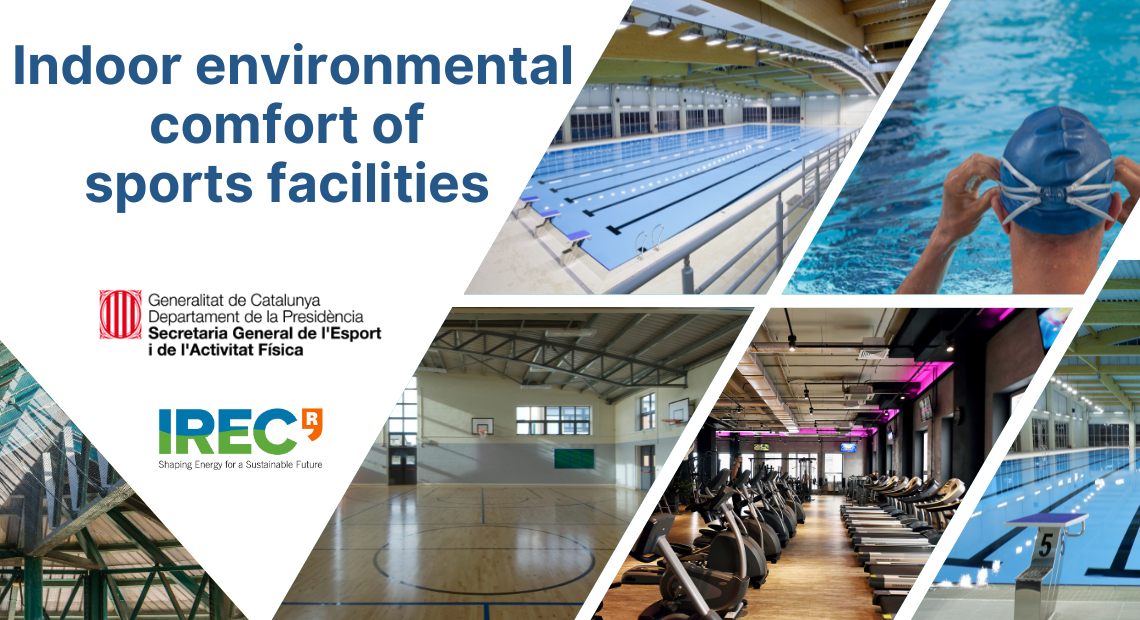The Institute for Energy Research (IREC) and the Consell Català de l’Esport (Catalan Sports Council) of the Generalitat de Catalunya have been working in close collaboration to enhance the indoor environmental comfort of sports facilities across Catalonia. This project, spearheaded by IREC’s Thermal Energy and Building Performance group, has involved a comprehensive analysis of the Sports Equipment Census database in collaboration with the responsible department of the Catalan Sports Council.
This collaboration has been a result of a partnership that began in 2015 and was renewed until 2022. Over the years, both parties have conducted research on energy related topics with the aim of achieving nearly zero-energy sports facilities (nZEB) and assessing indoor environmental quality of sports pavilions and swimming pools. The alliance has focused on the energy aspects of sports facilities in Catalonia, with the goal of contributing to the objectives set out in the Catalonia 2030 Agenda.
The specific objective of the collaboration between Esportcat and IREC has been to develop a research and technology transfer project to define comfort parameters for individuals and air quality in indoor sports spaces. The project also aimed to promote the energy-efficient design and management of sports facilities to contribute to the Sustainable Development Goals (SDGs) 2030. Esportcat and IREC are now planning a new phase of the collaboration, focusing on rooms inside sports facilities, such as fitness and weight rooms.
The report, which is the preliminary study of this new research, provides first a detailed analysis of the Sports Equipment Census of Catalonia, to find out the most common typologies and characteristics of weight and fitness rooms. After that, the report contains an overview of how environmental comfort in sports centre rooms is determined, according to different existing references at regional, national, European, and international levels. This research is a significant step towards creating more comfortable and conducive environments for sports and physical activities, ultimately promoting healthier and more active lifestyles.
In 2019, nearly three-quarters of the population in Catalonia engaged in physical or sports activities on a weekly basis for most of the year. An additional 18% participated irregularly, either seasonally or occasionally. This means that a staggering 90% of the population can be considered physically active, underscoring the importance of understanding comfort levels for indoor sports activities.
The results of the project, including the reports “Comfort and Air Quality in Sports Halls” and “Analysis of the Inventory of Indoor Halls for Sports Activities in Catalonia”, are now available for public access. These reports provide valuable insights into the most common typologies of weight and fitness rooms in sports facilities in Catalonia and offer an overview of how the topic of indoor environmental quality is addressed in different countries.
The partnership between IREC and the Catalan Sports Council is a shining example of how research and collaboration can lead to tangible improvements in our sports facilities. As we continue to promote physical activity and healthy lifestyles, it is crucial that we also invest in creating environments that are comfortable, safe, and conducive to these activities. This research project is a significant step in that direction.
We invite you to explore the findings of this collaboration and join us in our commitment to creating a more sustainable and healthy future for sports facilities in Catalonia.
For more information, please visit the report “Comfort and Air Quality in Sports Halls” and “Analysis of the Inventory of Indoor Halls for Sports Activities in Catalonia” (in Catalan)




